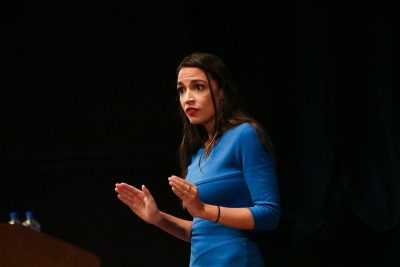
Congressional candidate Alexandria Ocasio-Cortez visited Boston University Monday to discuss her BU experience and campaign story in front of a packed Tsai Performance Center.
Ocasio-Cortez, who describes her views as democratic socialist, won the New York 14th Congressional District Democratic primary in June, beating 10-term incumbent Joe Crowley.
Ocasio-Cortez began by discussing her experience growing up in a working-class family, which she said impressed upon her the “truths of injustice,” and that it is difficult for working-class families to get ahead even if they work their hardest.
Eva Russo, a sophomore in the College of Arts and Sciences, said her personal experiences made Ocasio-Cortez’s campaign especially meaningful to her.
“Being from New York, I think it was personal because I’ve been to the neighborhood she’s from, I’ve seen the injustice with my own eyes, and the idea that your ZIP code determines the resources you get,” Russo said. “Being on the better end of that, I recognize that, and I just think that everything she stands for is so inspiring and so directed for change in the right way.”
She then discussed her college experience. Though Ocasio-Cortez called BU an institution that “has the soul of a mission of social justice,” she said that a college education is not necessary to enact change.
“You don’t need a fancy degree or a fancy education to realize what fighting for the right thing means,” Ocasio-Cortez said. “That fighting for quality education for all children is the right thing. That to fight for healthcare and the same clean air and the same processes of criminal justice for all people is not a radical thing, it is the right thing.”
Her experiences working with children and working in restaurants after college, she said, educated her on such issues as labor violations and the plight of undocumented individuals, which deepened her devotion to activism.
Ocasio-Cortez said she was initially pessimistic about electoral politics, believing that the U.S. government was ruled by “dark money” and “dynastic power” and had little room for marginalized voices. However, she said, her views changed during the 2016 election season.
“I realized that we cannot afford to dismiss and give up on the only system of self-governance that we have,” Ocasio-Cortez said. “We cannot afford to give up our power, we cannot afford to give up our democracy.”
CAS junior Dong-Seop Eah said he appreciated seeing how a BU alum is making a difference in the world and that hearing about the early stages of Ocasio-Cortez’s campaign was enlightening and inspiring.
“[Her early campaign was] not really something that was covered in the media, so that was my first time hearing that,” Eah said. “Hearing about her going from living room to living room in the Bronx, that was really inspiring to hear.”
Current political turmoil makes it easy for citizens to think that their actions mean nothing, Ocasio-Cortez said, and to “put [their] heads in the sand.”
“The point is for it to be so crazy that you check out,” Ocasio-Cortez said. “The point is that you believe that your vote, that your $5 contribution, that your 30 minutes on a Friday, won’t change anything. And the reason they try and convince so many people of that is because it is actually the most powerful thing in the world.”
Laura Brown, a second-year graduate student in the College of Communication, said she came to the talk because she needed some inspiration in today’s tumultuous times.
“[I was inspired by] the fact that [Ocasio-Cortez] was able to win such a historic election, and she’s been able to achieve so much at such a relatively young age and coming from the background that she’s come from,” Brown said.
The talk ended with a short Q&A session, in which Ocasio-Cortez answered questions on topics including the Senate hearing for Supreme Court nominee Brett Kavanaugh, raising awareness of social issues and grassroots campaigning.
On the topic of grassroots activism, Ocasio-Cortez said the most important elements are consistency and persistence.
Ocasio-Cortez urged men and allies to speak up on behalf of sexual assault survivors and urged people in general to recognize their privilege and discuss it with those who share that privilege.
“Oftentimes, what people need is to feel like they are talking to someone that understands them,” Ocasio-Cortez said. “And to them, someone that understands them is the person with the same privilege that they have. And so when you can have those kinds of conversations in confidence, it can dismantle a lot of the defensiveness.”
CAS junior Samantha Delgado, who arranged the talk, had never heard of Ocasio-Cortez before the New York primary election, but she was inspired by Ocasio-Cortez’s win, she said.
“There was just this feeling in my heart where I was like, ‘Wow, there’s someone who just did this crazy thing that looks [like me] and shares [a] similar identity to me,’ because I’m also a young Hispanic woman looking to pursue a career in government or politics,” Delgado said. “And I’ve always felt like you have a lot to prove for that, and there’s a lot of obstacles against you, but she did it.”
The talk was less about touting Ocasio-Cortez’s political views, Delgato said, and more about showing BU students an example of an alumna who has gone on to do great things.
“You can agree or disagree with her, and I totally respect that, but I think she brings this air of success, hope, inspiration to be able to overcome the obstacles in our lives and achieve what we want to do,” Delgado said.























































































































